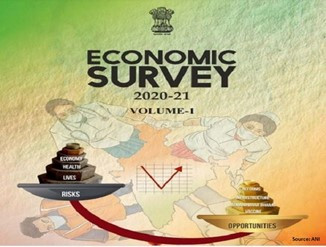
On the first day of the budget session, Finance Minister Nirmala Sitharaman tabled the 2020-21 Economic Survey in Parliament. Authored by a team headed by Chief Economic Advisor Krishnamurthy Venkata Subramanian, the Economic Survey 2020-21 outlines the condition of various sectors of the economy as well as the reforms to boost growth that should be undertaken.
The Economic Survey has championed the government’s continued expansionary fiscal policy to ensure growth returns to the pre-COVID levels. It said a growth recovery will boost revenue collections and assist India to return to a sustainable fiscal path.
The Economic Survey seems to indicate that, in order to push growth, the government can remain with a higher fiscal deficit. It implies that in the Indian sense, growth contributes to debt sustainability. Lower debt, on the contrary, does not necessarily lead to growth. This is because the debt interest rate paid by the government has been lower than that of the growth rate of India.
The Survey tires to cast away concerns about India’s debt rate, saying that the country will not have to worry about debt as long as the GDP continues to increase. The Survey claims that, in the case of India, higher GDP growth has caused the debt-to-GDP ratio to decline over the last two and a half decades. However, the reverse isn’t accurate.

The fifth-largest economy in the world has never been ranked as the lowest rung of the investment-grade (BBB-/Baa3) in the history of Sovereign Credit Ratings (SCRs). Though SCRs do not represent the fundamentals of the Indian economy, the Survey notes that these noisy, opaque and biased credit ratings harm FPI flows.
To reflect the capacity and willingness of economies to pay their debt obligations by being more open and less subjective, the methodology of SCRs must be changed. As soon as the COVID-19 relief measures are lifted, a fresh asset quality review of Indian banks would be required, the Survey suggested. To ensure that past errors are not repeated, the Chief Economic Advisor called for a clean-up of bank books.
In order to guide policymaking, the Survey also indicated that a greater emphasis on core inflation is justified. It mentioned that the sole emphasis on Consumer Price Index (CPI) Inflation to set monetary policy may not be sufficient.

The Chief Economic Advisor points out that the strategy that tries to account for any possible outcome is the root cause of the over-regulation crisis. Both the economic theory and the proof illustrates that it is not possible to write regulations that account for all possible consequences in an unpredictable and dynamic environment. In this complicated environment, choice in decision making is inevitable. The solution is to simplify regulations and invest in greater oversight, which implies a willingness to allow certain independence to be balanced with accountability and transparency.
The Economic Survey has said that in a new free-market period, the new farm laws, which are being opposed by farming groups, would be beneficial to small and marginal farmers and herald Indian agriculture.
In India, unlike in the advanced economies, the economic growth and inequality converge; in terms of their impact on socio-economic indicators. Economic development has a much greater effect on alleviating poverty than on inequality. Given India’s stage of progress, India must continue to concentrate on its economic growth to lift the poor out of poverty by expanding the overall pie. In a developed economy, redistribution of wealth is only possible if the size of the economic pie increases.
The Economic Survey made a case for higher private-sector R&D spending to boost India’s innovations. The survey also pointed out that relying on ‘jugaad innovation’ risks missing the critical opportunity to innovate our way into the future.
Written By- SEJAL JAIN
SOURCES-
https://www.thehindu.com/business/economic-survey-2021-updates/article33694041.ece
https://www.bloombergquint.com/economic-survey-2021/economic-survey-2021-top-10-highlights
https://www.indiabudget.gov.in/economicsurvey/

